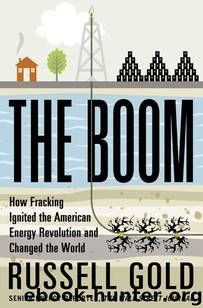The Boom: How Fracking Ignited the American Energy Revolution and Changed the World by Russell Gold

Author:Russell Gold [Gold, Russell]
Language: eng
Format: epub, mobi
ISBN: 9781451692280
Amazon: 1451692285
Publisher: Simon & Schuster
Published: 2014-04-08T06:00:00+00:00
McClendon became convinced by around 2003 that whichever company could grab the most acreage would succeed. Those who dallied would be left behind. By the middle of 2006, he was already declaring victory in the land grab. “The winners for the next ten to twenty years have already been chosen, and the losers will pay the price for years to come. History has shown that Oklahomans did very well in the land run of 1889,” he said, a reference to the giveaway to settlers of two million acres. “I believe that history will also note that Chesapeake did very well in the land run of 2000 to 2006.” Every lease signed by Chesapeake contained a countdown. Depending on the lease, the company had between three and five years to drill a well. Once the well was drilled and began producing gas or oil, Chesapeake could hold the lease forever—or as long as the well was in operation. If no well was drilled, the lease would expire, and its investment would be lost. Talking to investors in 2006, McClendon boasted that it was meeting its drilling obligations. It had 101 drilling rigs operating, the highest number of any company since 1985, and it was adding rigs.
McClendon wasn’t a mere participant in the great shale land grab. He created it. John Pinkerton was the longtime chief executive of Range Resources, the first company to drill wells targeting the Marcellus Shale. “When Aubrey joined the party, all of a sudden the land grab started,” he said. This acceleration was unhealthy for all involved. The public wasn’t prepared for the onslaught of landmen, regulators were forced to play catch-up, and the industry drilled wells so quickly that common sense was jettisoned at times.
Pinkerton grew concerned about this haste in 2008 after meeting with Pennsylvanians who thought the gas industry was the second coming of coal mining that left the state scarred, with streams poisoned by acid that leached from opened mines. He wanted to be more transparent and hired a team to talk to the public and government officials. He also tried to enlist other CEOs in this effort. He said he couldn’t get through to McClendon. “Aubrey was just too schizophrenic. He was everywhere. I couldn’t get him on the phone. He totally agreed with me. But he was going so fast, running so many rigs,” said Pinkerton. “He was spending all this money and had twenty-five-year old engineers from Oklahoma drilling wells by telephone.”
Still, Chesapeake’s strategy was copied and envied. Investment professionals wanted to hear how McClendon had pulled the company from the brink of collapse and transformed it into a Wall Street darling. The company’s conference calls, where McClendon would talk at length about his view of the energy landscape, were crowded with people dialing in to listen to the Oracle of Oklahoma City.
To finance its rapid expansion, Chesapeake began spending more money than it took in. In its financial results for April through July 2004, the company reported generating $328.8 million from energy operations.
Download
The Boom: How Fracking Ignited the American Energy Revolution and Changed the World by Russell Gold.mobi
This site does not store any files on its server. We only index and link to content provided by other sites. Please contact the content providers to delete copyright contents if any and email us, we'll remove relevant links or contents immediately.
| Alternative & Renewable | Drilling Procedures |
| Electric | Fossil Fuels |
| Mining | Nuclear |
| Power Systems |
Whiskies Galore by Ian Buxton(40328)
Introduction to Aircraft Design (Cambridge Aerospace Series) by John P. Fielding(32338)
Small Unmanned Fixed-wing Aircraft Design by Andrew J. Keane Andras Sobester James P. Scanlan & András Sóbester & James P. Scanlan(32141)
Craft Beer for the Homebrewer by Michael Agnew(17445)
Turbulence by E. J. Noyes(7037)
The Complete Stick Figure Physics Tutorials by Allen Sarah(6638)
Kaplan MCAT General Chemistry Review by Kaplan(6053)
The Thirst by Nesbo Jo(5784)
Bad Blood by John Carreyrou(5768)
Learning SQL by Alan Beaulieu(5409)
Weapons of Math Destruction by Cathy O'Neil(5035)
Man-made Catastrophes and Risk Information Concealment by Dmitry Chernov & Didier Sornette(4735)
iGen by Jean M. Twenge(4702)
Digital Minimalism by Cal Newport;(4539)
Life 3.0: Being Human in the Age of Artificial Intelligence by Tegmark Max(4504)
Audition by Ryu Murakami(4097)
1,001 ASVAB Practice Questions For Dummies by Powers Rod(4038)
Electronic Devices & Circuits by Jacob Millman & Christos C. Halkias(4026)
Pale Blue Dot by Carl Sagan(4001)
